Connect With Us
Items filtered by date: October 2024
Why Live with Pain and Numbness in Your Feet?
Causes of Intoeing in Infancy and Childhood
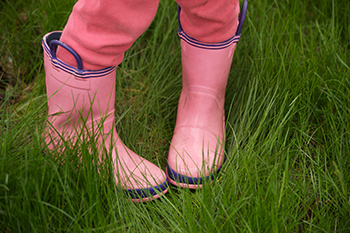
Intoeing, commonly referred to as pigeon toes, is a condition where a child's feet point inward when walking or standing. This alignment issue is often noticeable during infancy and can persist into later childhood. Factors that contribute to intoeing, include genetic predisposition and the natural development of the musculoskeletal system. In infants, intoeing may result from the position in the womb, as tight spaces can affect foot positioning. As children grow, it can be linked to conditions such as femoral anteversion, where the thigh bone is rotated inward, or tibial torsion, where the shinbone twists. While intoeing often improves as children grow, persistent cases may require evaluation by a podiatrist. If your child has this condition, it is strongly suggested that you are under the care of a podiatrist who can effectively monitor intoeing.
The health of a child’s feet is vital to their overall well-being. If you have any questions regarding foot health, contact one of our podiatrists of The Podiatry Center, PC. Our doctors can provide the care you need to keep you pain-free and on your feet.
Tips for Keeping Children's Feet Healthy
- Make sure their shoes fit properly
- Look for any signs of in-toeing or out-toeing
- Check to see if they have Clubfoot (condition that affects your child’s foot and ankle, twisting the heel and toes inward) which is one of the most common nonmajor birth defects.
- Lightly cover your baby’s feet (Tight covers may keep your baby from moving their feet freely, and could prevent normal development)
- Allow your toddler to go shoeless (Shoes can be restricting for a young child’s foot)
- Cut toenails straight across to avoid ingrown toenails
- Keep your child’s foot clean and dry
- Cover cuts and scrapes. Wash any scratches with soap and water and cover them with a bandage until they’ve healed.
If you have any questions, please feel free to contact our office located in Millburn, NJ . We offer the newest diagnostic and treatment technologies for all your foot care needs.
Tips for Improving Your Balance
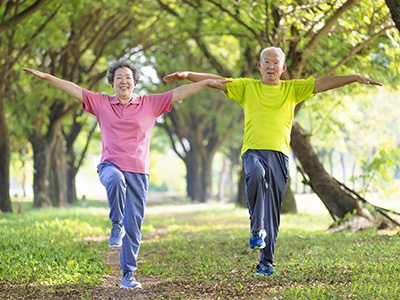
Improving balance is an important way to reduce the risk of falls, especially as people age. Foot-related issues such as nerve damage, weakened muscles, and joint problems can disrupt balance and increase the risk of injury. Exercises that focus on foot strength and flexibility are helpful in maintaining stability. Finding supportive footwear that fits well can also make a significant difference by providing a stable base. A podiatrist can assess any medical conditions that affect your feet, such as fallen arches or neuropathy. Custom orthotics, certain exercises, or assistive devices can help to improve your balance. Scheduling regular foot check-ups is a good way to detect early signs of issues that might contribute to instability. Making small changes, such as decluttering walkways and ensuring adequate lighting, can reduce hazards at home. If you have fallen and have injured your foot or ankle, or at risk for falling, it is suggested that you schedule an appointment with a podiatrist for an exam and treatment options.
Preventing falls among the elderly is very important. If you are older and have fallen or fear that you are prone to falling, consult with one of our podiatrists from The Podiatry Center, PC. Our doctors will assess your condition and provide you with quality advice and care.
Every 11 seconds, an elderly American is being treated in an emergency room for a fall related injury. Falls are the leading cause of head and hip injuries for those 65 and older. Due to decreases in strength, balance, senses, and lack of awareness, elderly persons are very susceptible to falling. Thankfully, there are a number of things older persons can do to prevent falls.
How to Prevent Falls
Some effective methods that older persons can do to prevent falls include:
- Enrolling in strength and balance exercise program to increase balance and strength
- Periodically having your sight and hearing checked
- Discuss any medications you have with a doctor to see if it increases the risk of falling
- Clearing the house of falling hazards and installing devices like grab bars and railings
- Utilizing a walker or cane
- Wearing shoes that provide good support and cushioning
- Talking to family members about falling and increasing awareness
Falling can be a traumatic and embarrassing experience for elderly persons; this can make them less willing to leave the house, and less willing to talk to someone about their fears of falling. Doing such things, however, will increase the likelihood of tripping or losing one’s balance. Knowing the causes of falling and how to prevent them is the best way to mitigate the risk of serious injury.
If you have any questions, please feel free to contact our office located in Millburn, NJ . We offer the newest diagnostic and treatment technologies for all your foot care needs.
Do Your Child's Feet Hurt?
Everyday Foot Care Routine for Healthy Feet and Toenails
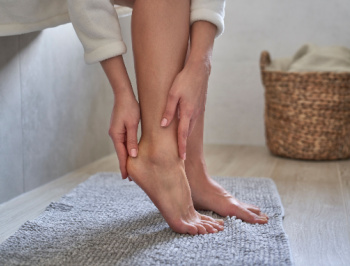
Maintaining a consistent foot care routine is vital for overall foot health and can prevent common issues such as infections and discomfort. Start by washing your feet daily with mild soap and warm water, including between the toes. After washing, dry your feet thoroughly to prevent moisture buildup. Regularly moisturize the skin, focusing on the heels and any dry areas, but avoid the spaces between the toes to prevent fungal growth. Check your toenails frequently, trimming them straight across to avoid ingrown nails. Wearing breathable shoes and changing socks daily can also help keep feet dry and healthy. Lastly, consider giving your feet a break with gentle stretches and massages to improve circulation. If you have developed foot conditions from lack of practicing a regular foot care routine, it is suggested that you contact a podiatrist who can treat various foot ailments and advise you on a foot care routine that is right for you.
Everyday foot care is very important to prevent infection and other foot ailments. If you need your feet checked, contact one of our podiatrists from The Podiatry Center, PC. Our doctors can provide the care you need to keep you pain-free and on your feet.
Everyday Foot Care
Often, people take care of their bodies, face and hair more so than they do for their feet. But the feet are a very important aspect of our bodies, and one that we should pay more attention to. Without our feet, we would not be able to perform most daily tasks.
It is best to check your feet regularly to make sure there are no new bruises or cuts that you may not have noticed before. For dry feet, moisturizer can easily be a remedy and can be applied as often as necessary to the affected areas. Wearing shoes that fit well can also help you maintain good foot health, as well as making it easier to walk and do daily activities without the stress or pain of ill-fitting shoes, high heels, or even flip flops. Wearing clean socks with closed shoes is important to ensure that sweat and bacteria do not accumulate within the shoe. Clean socks help to prevent Athlete’s foot, fungi problems, bad odors, and can absorb sweat.
If you have any questions please feel free to contact our office located in Millburn, NJ . We offer the newest diagnostic and treatment technologies for all your foot and ankle needs.
Essential Stretches for Runners to Prevent Injuries
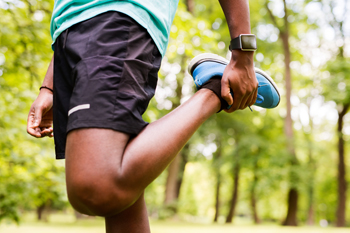
Injury prevention is vital for runners, and incorporating both static and dynamic stretches into a routine can significantly enhance performance and reduce the risk of injuries. Static stretches involve holding a position for a period, promoting flexibility and helping to lengthen muscles. Common static stretches for runners include hamstring and calf stretches, which can alleviate tension after a run. Conversely, dynamic stretches involve active movements that prepare the body for exercise, such as leg swings and walking lunges. These movements increase blood flow to the muscles and improve range of motion, making them ideal before hitting the track or trail. By integrating both types of stretching, runners can enhance their overall flexibility, strengthen key muscle groups, and create a solid foundation for injury-free running. If you have sustained a foot or ankle injury while running, it is suggested that you consult a podiatrist who can offer you relief options, and guide you on additional running injury prevention stretches.
Exercising your feet regularly with the proper foot wear is a great way to prevent injuries. If you have any concerns about your feet, contact one of our podiatrists of The Podiatry Center, PC. Our doctors will treat your foot and ankle needs.
How to Prevent Running Injuries
Many common running injuries are caused by overuse and overtraining. When the back of the kneecap starts wearing out and starts causing pain in your knee, this is commonly referred to as runner’s knee. Runner’s knee is a decrease in strength in your quadriceps and can occur if you’re not wearing properly fitted or supporting shoes. To prevent runner’s knee, focusing on hip strengthening is a good idea, as well as strengthening your quads to keep the kneecaps aligned.
What Are Some Causes of Running Injuries?
- One cause of a common running injury is called iliotibial band syndrome.
- Plantar fasciitis is also another common injury.
- Stress fractures can occur from overtraining, lack of calcium, or even your running style.
Best Ways to Prevent Running Injuries
- Wear footwear that fits properly and suits your running needs.
- Running shoes are the only protective gear that runners have to safeguard them from injury.
- Make a training schedule. Adding strengthening exercises as well as regular stretching can help keep you strong and limber and can lessen the possibility of injuries.
- Stretching keeps muscles limber; this will help you gain better flexibility.
If you have any questions please feel free to contact our office located in Millburn, NJ . We offer the newest diagnostic and treatment technologies for all your foot and ankle needs.
Wounds That Don't Heal Need to Be Checked
Causes of Foot and Ankle Injuries in Basketball
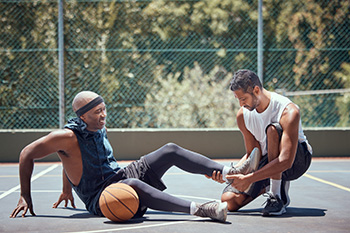
Basketball players often face foot and ankle injuries due to the sport's high-impact and dynamic nature. Common injuries include muscle strains, stress fractures, midfoot sprains, and Achilles tendon injuries. Muscle strains occur from sudden movements or excessive stress on the leg muscles. Stress fractures, often caused by repetitive impact, can lead to pain and swelling. Midfoot sprains result from twisting or rolling the foot, while Achilles tendon injuries usually arise from intense jumping or sprinting. To reduce the risk of these injuries, players should focus on proper warm-ups, strengthen their muscles through targeted exercises, and use supportive footwear. Additionally, practicing good technique and maintaining overall physical conditioning can help prevent common foot and ankle issues. If you enjoy playing basketball and have sustained a foot or ankle injury, it is suggested that you are under the care of a podiatrist who can treat it accordingly.
Ankle and foot injuries are common among athletes and in many sports. They can be caused by several problems and may be potentially serious. If you are feeling pain or think you were injured in a sporting event or when exercising, consult with one of our podiatrists from The Podiatry Center, PC. Our doctors will assess your condition and provide you with quality foot and ankle treatment.
Common Injuries
The most common injuries that occur in sporting activities include:
- Achilles Tendonitis
- Achilles Tendon Rupture
- Ankle Sprains
- Broken Foot
- Plantar Fasciitis
- Stress Fractures
- Turf Toe
Symptoms
Symptoms vary depending upon the injury and in some cases, there may be no symptoms at all. However, in most cases, some form of symptom is experienced. Pain, aching, burning, bruising, tenderness, tightness or stiffness, sensation loss, difficulty moving, and swelling are the most common symptoms.
Treatment
Just as symptoms vary depending upon the injury, so do treatment options. A common treatment method is known as the RICE method. This method involves rest, applying ice, compression and elevating the afflicted foot or ankle. If the injury appears to be more serious, surgery might be required, such as arthroscopic or reconstructive surgery. Lastly, rehabilitation or therapy might be needed to gain full functionality in the afflicted area. Any discomfort experienced by an athlete must be evaluated by a licensed, reputable medical professional.
If you have any questions, please feel free to contact our office located in Millburn, NJ . We offer the newest diagnostic and treatment technologies for all your foot care needs.
Blog Archives
- April 2025
- March 2025
- February 2025
- January 2025
- December 2024
- November 2024
- October 2024
- September 2024
- August 2024
- July 2024
- June 2024
- May 2024
- April 2024
- March 2024
- February 2024
- January 2024
- December 2023
- November 2023
- October 2023
- September 2023
- August 2023
- July 2023
- June 2023
- May 2023
- April 2023
- March 2023
- February 2023
- January 2023
- December 2022
- November 2022
- October 2022
- September 2022
- August 2022
- July 2022
- June 2022
- May 2022
- April 2022
- March 2022
- February 2022
- January 2022
- December 2021
- November 2021
- October 2021
- September 2021
- August 2021
- July 2021
- June 2021
- May 2021
- April 2021
- March 2021
- February 2021
- January 2021
- December 2020
- November 2020
- October 2020
- September 2020
- August 2020
- July 2020
- June 2020
- May 2020
- April 2020
- March 2020
- February 2020
- January 2020
- December 2019
- November 2019
- October 2019
- September 2019
- August 2019
- July 2019
- June 2019
- May 2019
- April 2019
- March 2019
- February 2019
- January 2019
- December 2018
- November 2018
- October 2018
- September 2018
- August 2018
- July 2018
- June 2018
- May 2018
- April 2018
- March 2018
- February 2018
- January 2018
- December 2017
- November 2017
- October 2017
- September 2017
- August 2017
- July 2017
- June 2017
- May 2017
- April 2017
- March 2017
- February 2017
- January 2017
- December 2016
- November 2016
- October 2016
- September 2016
- August 2016
- July 2016
- June 2016
- May 2016
- April 2016
- March 2016
- February 2016
- January 2016
- December 2015
- November 2015
- October 2015
- September 2015
- August 2015
- July 2015
- June 2015
- May 2015
- January 2014
- December 2013
- November 2013
- October 2013
- September 2013
- August 2013
- July 2013
- June 2013
- May 2013
- April 2013
- March 2013
- February 2013
- January 2013
- December 2012
- November 2012
- October 2012
- September 2012
- August 2012
- July 2012
- June 2012



